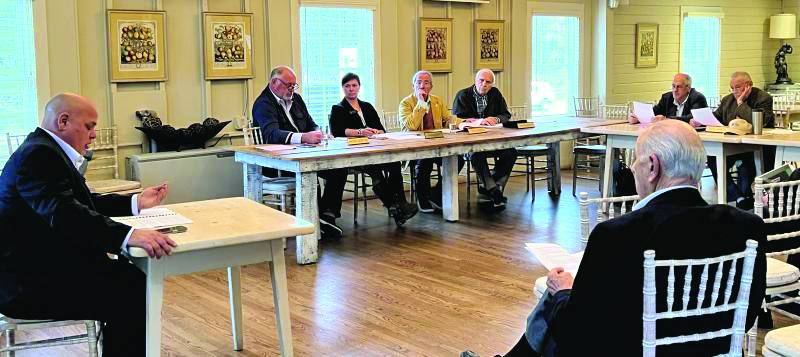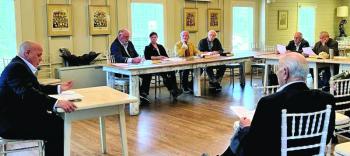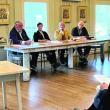Maine Yankee: Feds found protected area’s material condition excellent
The Maine Yankee Community Advisory Panel (CAP) on Spent Nuclear Fuel Storage and Removal convened its annual public meeting Oct. 29. Panel members and attendees heard presentations on the status of the Maine Yankee Independent Spent Fuel Storage Installation (ISFSI) along with updates on federal and state topics related to the long-term storage and future removal of the Spent Nuclear Fuel (SNF). The meeting took place at Montsweag Restaurant in Woolwich.
After introductory remarks by CAP Chair Don Hudson, Maine Yankee ISFSI Manager Dan Laing provided a comprehensive update on the Maine Yankee ISFSI and related site activities conducted over the past year. Laing reported that Maine Yankee achieved a significant safety milestone Aug. 11, surpassing one million person-hours since the company’s last lost-time accident in 2005. His presentation documented the positive outcome of the May 2024 US Nuclear Regulatory Commission inspection at the site. “The inspectors concluded that Maine Yankee’s licensing documentation was thorough and accurate, and the material condition of the protected area is excellent. The inspectors specifically commented on the ownership, professionalism, and pride of the entire site team,” said Laing. He noted the successful execution of the 2024 Emergency plan drill, the completion of regulatory and industrial camera replacement projects at the site, and activities related to the canister aging management program, including that the next canister inspection will be in 2026.
Kathleen Capstick, the director of government and public affairs for Maine Yankee, updated the CAP on the current national status of the removal, disposal, and long-term storage of spent nuclear fuel. This included information regarding the Department of Energy's (DOE) initiatives to establish a consent-based siting process for one or more federal consolidated interim storage facilities (CISF) and the 12 DOE grant-recipient consortia teams that are working with communities nationwide to build trust and interest in this process. During Capstick’s presentation, the CAP discussed the Energy Communities Alliance (ECA), one of the 12 consortia teams working on DOE’s consent-based siting efforts, fall quarterly meeting that took place at Chewonki Foundation in Wiscasset on Oct. 16-17. Four CAP members attended the meeting, including CAP Chair Hudson and CAP Vice Chair Dan Thompson, who spoke to the ECA about their experiences as Maine Yankee CAP members and the value of community engagement during the decommissioning of Maine Yankee. The meeting included 40 participants from around the country, made up of federal, state, local, tribal, and industry leaders, who collaborated to identify opportunities for alignment on nuclear waste policies and the interim storage of spent nuclear fuel. On the first day of the conference, Maine Yankee provided a tour of the Maine Yankee ISFSI for attendees.
After a period for public comment, including a discussion among CAP members about the lengthy process of removing SNF from the site and the importance of pursuing a consent-based siting process, the panel unanimously agreed to send a letter from the CAP to the Maine Congressional Delegation thanking them for their efforts to keep the SNF issue at the forefront of DOE priorities and requesting that they continue these efforts. “I appreciate the leadership that Senators Collins and King and Rep. Pingree have consistently demonstrated in trying to resolve the decades-long policy impasse on the SNF issue,” said CAP Chair Hudson.
Hudson, Vice Chair Dan Thompson, CAP members Ralph Keyes, Steve Jarrett, State Senator Cameron Reny and Maine Yankee President Wayne Norton attended the meeting. The audience included staff from Maine Yankee and Yankee Companies, Maine State House Representative Ed Polewarczyk, representatives from the offices of Sen. Angus King and Sen. Susan Collins, a member of the Lincoln County Board of Commissioners, Wiscasset’s Director of Economic Development, and Lincoln County residents. Maine State Nuclear Safety Inspector and CAP member Jay Hyland provided a written report to the CAP, which was included in meeting documents.
The Maine Yankee CAP’s purpose is to advocate for the federal government's removal of the spent nuclear fuel (SNF) from Maine Yankee, as mandated by the Nuclear Waste Policy Act of 1982. Maine Yankee was a nuclear power facility located in Wiscasset, which operated from 1972 to 1996 and was decommissioned and dismantled between 1997 and 2005. A Security Operations Building, Maintenance Building, and ISFSI remain on the site. The ISFSI contains 60 airtight sealed concrete and steel canisters, which hold 1,434 spent nuclear fuel assemblies and four Greater Than Class C waste canisters.
The Maine Yankee CAP has been a model for other advisory panels. It was established in 1997 as the Community Advisory Panel on Decommissioning. After the completion of the Maine Yankee decommissioning in 2005, the panel was renamed the Community Advisory Panel on Spent Nuclear Fuel Storage and Removal. This evolution aimed to promote open communication, education, and public involvement regarding spent nuclear fuel storage at Maine Yankee.




































